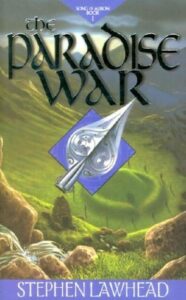 The Paradise War, Stephen Lawhead
The Paradise War, Stephen Lawhead
The Paradise War is a book I read as a teenager, and which left a pretty deep impression on me — and honestly I couldn’t really tell you why, except that it’s a sort of portal fantasy and that has always appealed to me, and it was all about a Celtic Otherworld which is beautifully, painfully more real than our drab existence. Lawhead manages to describe both so vividly — the dreary car trip from Oxford to Scotland, punctuated by mucky service stations versus the vital sharpness of the Otherworld — that it stuck with me.
I had read another of Lawhead’s books in my late teens and found it dreadful, and also I think rather overly Christian in themes and story. So I was prepared for the Suck Fairy to have visited this and stolen away the magic, but I have to report that it didn’t, really. Much of the story was very deeply familiar to me, because I was a heck of a rereader in those days, and I must’ve read it at least times. Some of it I’d forgotten, but it all came rushing back as Lewis slowly moves through the Otherworld, learning what it means to live from the archetypical stories.
Now, I do find that Lawhead lays it on a bit thick, these days. He’s trying to describe awe and wonder, but I feel like sometimes a whole paragraph or even a page could be cut in service to the story. Which is pretty cool, to my mind: Lewis’ friend Simon stumbles through into the Otherworld, leaving Lewis behind, and eventually Lewis discovers (with the help of a nutty professor) that he must follow and persuade Simon to come back to the ‘real’ world. Naturally, Simon doesn’t want to come, and sets Lewis up to get carted off to a warrior’s school, where he finally loses some of his (deeply irritating) tendencies to complain, act cynical, and generally be a rather meh protagonist. Lewis begins to learn greatness and become something close to a hero — just as horrors are released upon the Otherworld.
Lawhead’s Celtic Otherworld is a bit of a mishmash, I think; I don’t actually know my Celtic sources super well beyond the Arthurian ones, but I’m pretty sure Ludd and Nudd are actually considered to be the same character, not quarreling brothers? But if you accept it as a Celtic-inspired story, it rolls along pretty well, at least one Lewis stops bloody complaining.
I’m actually looking forward to reading The Silver Hand; I remember loving it less, which leaves me curious as to whether it’ll have aged more or less well for me!

Leave a Reply